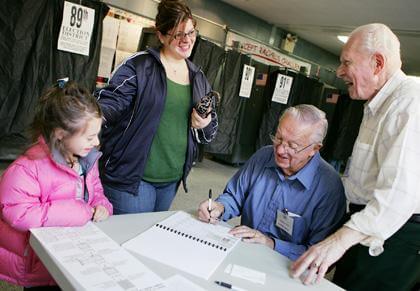By Jeremy Walsh
During an election marked by turmoil over term limits and a tempestuous Democratic primary season, Queens Republicans last week gained two seats in the City Council and solidified their hold over a third in a borough where the GOP is heavily outnumbered.
Flushing businessman Peter Koo triumphed over Yen Chou, a former aide to Councilman David Weprin (D-Hollis); Auburndale lawyer Dan Halloran defeated Kevin Kim, a former aide to U.S. Rep. Gary Ackerman (D-Bayside); and Councilman Eric Ulrich (R-Rockaway Beach) won re-election over longtime civic leader Frank Gulluscio.
Just over 1.1 million people voted in the mayoral race Nov. 3, compared with the nearly 1.3 million who voted in 2005, and the lower interest in that race appeared to have been reflected among Council contests.
Each Republican candidate won with a voter turnout considerably lower than the 2001 elections, the last time term limits created widespread turnover in the Council. Halloran won with 52.5 percent of 26,074 votes, according to preliminary numbers from cable news channel NY1. Full election results were not available from the city Board of Elections by press time Tuesday.
By contrast, current Councilman Tony Avella (D-Bayside) won with 48.8 percent of 34,089 votes in 2001.
Koo took Flushing with 49.6 percent of 16,293 votes compared with current Councilman John Liu’s (D-Flushing) 53.3 percent of 19,881 votes in 2001.
Ulrich, who won by the largest margin — 59.1 percent of 20,607 votes — still triumphed with a far smaller turnout than the previous councilman, state Sen. Joseph Addabbo (D-Howard Beach), enjoyed in 2001: 55.1 percent of 27,451 votes.
Michael Krasner, a professor of political science at Queens College, said both Democrats and Republicans suffered from voter apathy over the mayoral race, which many saw as a walk for Mayor Michael Bloomberg up until the votes were tallied.
“I think it’s clear that the Democrats have work to do,” Krasner said. “They’ve lost a whole bunch of mayoral elections and their strongest candidates didn’t run. … The party organizations were challenged successfully in several City Council races. That’s a sign that they don’t have the sway over their voters that they once have had.”
Krasner said the Republican victories in the 19th, 20th and 32nd districts were due more to area-specific issues than any over-arching political trend.
“I think that Halloran won in part because the Democrats had beat each other up pretty bad in the primary there, and also he’s an extremely able candidate,” Krasner said, noting he also believed Chou lost in large part because of the harsh criticisms of her Democratic primary foes. “I don’t know the opponent, but I think he probably wasn’t as good a campaigner.”
Vincent Tabone, executive vice chairman of the Queens GOP, seemingly stopped short of saying the Republican victories were a sea change in Queens politics, but praised his party for being in touch with voters.
“The unifying factor was that each of our victors were genuine community leaders involved with their communities and ran races focused on issues and challenges facing their communities,” he said in an e-mail.
Tabone characterized the perceived inevitability of Bloomberg’s re-election as shifting the spotlight on local races.
“Against this backdrop candidates with the best command of community issues tended to do very well,” he said, noting the GOP would look for similar qualities in candidates for state Legislature next year.
Krasner, meanwhile, doubted the Republican Council victories would translate to gains in next year’s state Legislature elections.
“I think it’s more a question of whether the Democrats can get their act together both in terms of local factors and in terms of the governor’s race,” he said.
Reach reporter Jeremy Walsh by e-mail at jewalsh@cnglocal.com or by phone at 718-229-0300, Ext. 154.



































